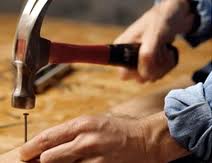
If you are in the fixer upper rental house business like me, you want to avoid bad tenants like you would ravenous zombies.
How do you go about avoiding bad tenants?
A good contract and checking out references is a good start to getting good tenants. But, despite our best efforts to weed them out, sometimes we still wind up with a someone who doesn’t pay on time, or who bugs us incessantly with phone calls for knick-knack repairs, or who bothers the neighbors.
Below are my observations on dealing with the inevitable bad tenant.
I give my renters a $25 dollar discount if they pay on the first of the month, or early. If they pay after that, then they pay the full amount of rent. I frame it this way so that it looks like they are getting a good deal if they pay on time.
I received a late rent payment earlier this month from a tenant, but it didn’t include the full amount. I called and he said he thought the due date was the 5th and not the first. I assured him that it was indeed the first. So, if the rent if $900 a month, they pay $875 if they pay on time or before the 1st. If they are even one day late, they don’t get the discount.
What happens if they pay late and don’t pay the late fee? I call them and remind them and insist that they send me the amount they owe ASAP. I usually require a fee of 1% of the rent for each day that the rent is late. If the rent is $700 and they are ten days late, then they pay an additional $70, or $7/day.
Late Pay = More $
I had one tenant who consistently paid 2 to 3 weeks late. The first couple of times he paid late, I sent him a “pay or get out form” legal form so he would get in the habit of paying all late fees. At first, it bothered me that he paid late, but then I realized I was making an extra $150 or more each month from his inability to pay on time. I actually started enjoying getting the late payments each month. I was getting an extra $1,800 a year just because the tenant had a personality flaw that made him always pay late. Of course, if he hadn’t pay the fee, I would have removed him from the house. In general, its best to get the rent on time, but there are times when one should be open and flexible enough to make a little extra money.
Do Tenants Stay or Go?
Granted, when you are renting out several properties at the same time, it can be headache if one tenant is paying late. You have to ask yourself, would you rather remove the tenant and go through the process of fixing up the property and searching for a new tenant, or just continue to rent it out under less than ideal conditions? Since my wife and I both have regular jobs, we usually opt to keep the tenant in the house as long as possible, unless they are not taking care of the property or not paying the rent. We subscribe to the landlord mantra of “the less turnover, the better”.
In a perfect world, all tenants would pay on time and stay in the property for 15-20 years. We’re still looking for that Ned Flanders-esque tenant.
As you might expect, the late-paying tenant left the house without paying the last month’s rent, last April. However, he rented the house for about 18 months, so with the security/clean up deposit that I kept, and all the late fees we received, we still came out well ahead.
You can usually see the signs that certain people are going to be “train-wreck” tenants. When they start off paying late right at the beginning of their lease, you know that’s not a good sign. But, at that point all you can do is stay on top of the situation and enforce the late payment rule until their inevitable departure. After the late-payer tenant left, I started using month-to-month rental contracts, which makes it a little easier to get rid of bad tenants.

 Subscribe in a reader
Subscribe in a reader
Share this: del.icio.us | Digg | Ma.gnolia | Reddit | Stumble Upon |










